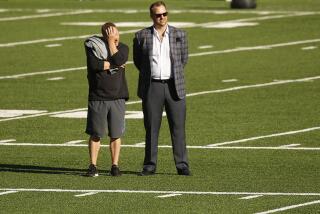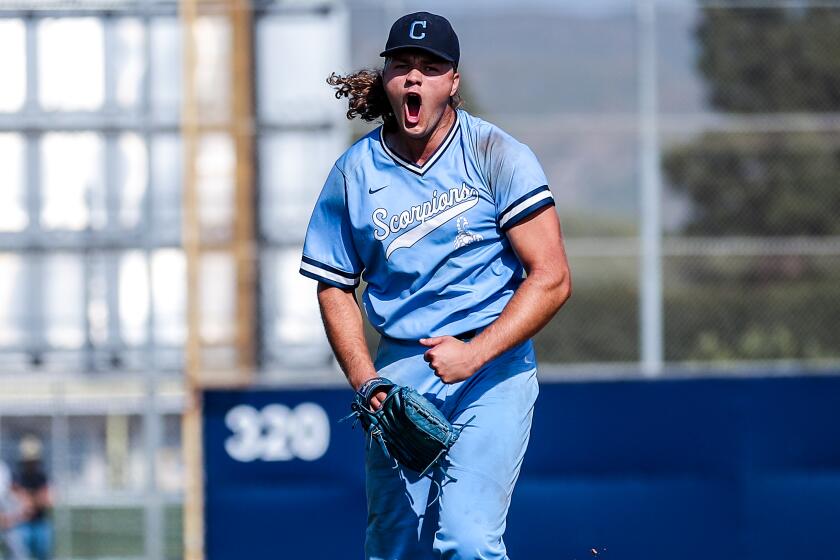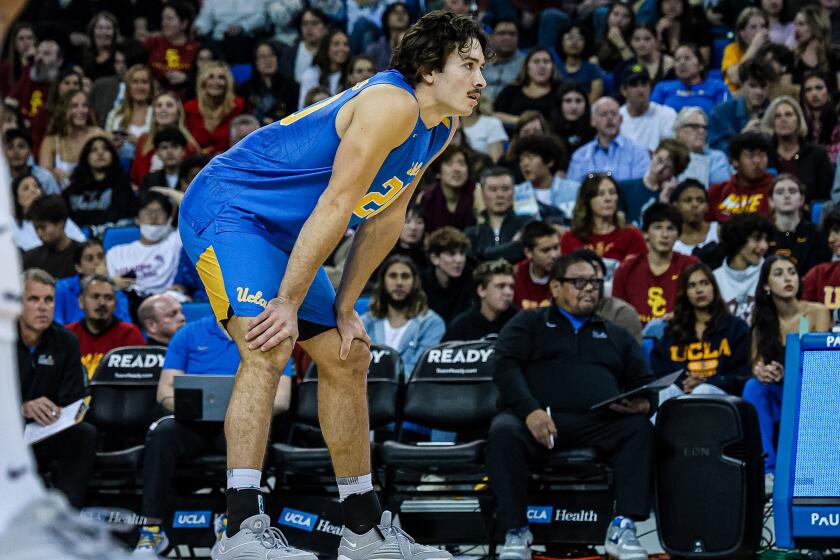Everyone’s Talking About the Masters--Except in Augusta
Behind a lush barrier of bamboo and pines as impregnable as a castle’s wall, Augusta National Golf Club appears snugly insulated from the controversy raging around it. While outsiders debate the club’s right to remain an all-male bastion, the only activity visible within its closed gates is the annual primping that precedes a new winter season at one of America’s most venerated golf courses.
If there is hand-wringing among club officials or its far-flung membership of 300 corporate titans and statesmen over a recent dust-up with women’s groups, it is for them--and them alone--to know.
For the record:
12:00 a.m. Sept. 19, 2002 For The Record
Los Angeles Times Thursday September 19, 2002 Home Edition Main News Part A Page 2 National Desk 15 inches; 569 words Type of Material: Correction
Gene Sarazen--In the Sept. 8 Section A, a caption accompanying a 1955 photo of Gene Sarazen identified the golfer as a U.S. Open champion but did not specify that he won that tournament in 1922 and 1932.
William W. “Hootie” Johnson, the club’s chairman, has been tight-lipped since he announced Aug. 30 that Augusta National would drop corporate sponsorship of its televised Masters tournament to avoid pressure from a coalition of women’s organizations that is pushing the club to accept female members. The club’s rank and file--if some of America’s richest and most powerful men can be considered such--are likewise staying mum.
Even some local supporters of the 70-year-old club--and there are many in Augusta, though few residents belong--politely decline to comment publicly for fear of being dragged into a scrap they say has little hope of a tidy outcome.
“I’m not touching that one,” said a female golfer who added that she has “mixed feelings” about Augusta National’s stance. The club has no rule against female members but argues that as a private club it reserves the right to decide when it will invite women, if ever.
There is nothing new in this insularity. Since its founding in 1932 by the late golfing great Bobby Jones, a Georgian, and Clifford Roberts, an Iowan turned New York money man, the club has crafted its own, often quirky, rules--and enforced them with a martinet’s severity. Club rules govern everything from the members’ signature green jackets (they are not to be worn off-premises) to the overall comportment of members (one was reportedly booted when it was discovered he kept two wives).
Among the rules is that members don’t discuss club affairs in public. So while it hosts one of golf’s most-watched and revered tournaments, Augusta National remains as shrouded in secrecy as Skull and Bones. Even in Augusta, where the Masters generates civic pride and millions of dollars in commerce each spring, much of what goes on at Augusta National wafts out merely as rumor. Each summer, the city’s golfing cognoscenti buzz over the club’s rumored new invitees.
“They don’t talk to us any more than they talk to anyone else,” said Dennis Sodomka, executive editor of the Augusta Chronicle. The newspaper’s publisher, William S. Morris III, is a club member, but he leaks nothing to the reporters writing about the Masters a floor below his office.
Augusta residents have kept out of the brouhaha. The Chronicle carried Johnson’s announcement on the front page, but the story fell off quickly. Few readers have written letters to the editor--an indication that many in town don’t see the club’s membership policies as any of their business.
“It’s just not something that interests anybody. It doesn’t affect anyone here except for a dozen people or so,” said Augusta Mayor Bob Young, who received his only correspondence, an e-mail, about the matter on Wednesday, five days after the issue flared up. (“Tell those boys at Augusta National that I am behind them 100%,” the message said.)
Since the club was built on 365 acres of nursery land, it has been left alone to tend its high-powered membership, which has included President Eisenhower; former Secretary of State George P. Shultz; Warren Buffett, chief executive officer of Berkshire Hathaway; Jack Welch, the former chairman of General Electric; Sanford Weill, CEO of Citigroup; Douglas Warner III, former CEO of J.P. Morgan; Robert Allen, former CEO of AT&T; Kenneth Chenault, chairman and CEO of American Express; and Lou Gerstner, former chairman of IBM.
Longtime club chairman Roberts presided with an iron fist. He made concession workers cut holes in their pockets to discourage them from raiding the till. He summarily dismissed members--and one Masters golfer--for breaching club decorum. He banned CBS broadcasters when he didn’t like what they said on the air. He demanded flawless grounds. He held down the costs of attending the Masters (tickets, known at the club as “badges,” go for $125, a fraction of their value on the open market, while the club’s famed pimento cheese sandwich still costs just $1.25). He also made it clear that opening membership to blacks and women was out of the question.
In 1977, Roberts shot himself to death on the club’s exquisitely manicured grounds, near the eighth hole. Roberts had ordered that his body be cremated and the ashes buried or scattered at the club. The site remains one of the club’s mysteries. There have been four chairmen since, including Johnson, 71, a former South Carolina banker who took over in 1998.
A cap on the share of local members--said to be 10%--means the club has been made up mainly of outsiders. Nonetheless, the city’s affection goes beyond the economic benefits brought by the Masters, which began in 1934. Residents know that without the tournament, Augusta, population 200,000, would be little more than a spot on the Savannah River that had outlived its glory years as a cotton-trading hub and textile manufacturer.
Sagging fortunes and a couple of shopping malls sucked the life out of downtown, where boarded-up storefronts remain despite a resurgence aided by new art galleries and eateries. A racially divided City Council has left municipal government in perpetual standoff. One of the few bright spots in a flat economy is a thriving medical industry--hospitals and medical schools--that has helped pay for homes in tony subdivisions around town. The Masters, though, put Augusta on the map and keeps it there, year after year. The club also donates more than $1 million yearly to local charities.
Augusta is a golf-crazy town, with no fewer than 16 courses. Augusta National’s traditionalism appeals to many here. The city of historic red-brick buildings and broad porches has retained its Southern manners even while Target and Pep Boys stores sprouted along its commercial boulevards. History matters here. A cocktail conversation in Augusta is likely to turn to family lineage, the depth of your local roots. Mark Darnell, who runs the private West Lake Country Club, jokes that he has lived in Augusta for 34 years and still is not yet viewed as a local.
“It’s still a small country town,” Darnell said. Some residents expressed pique that the groups challenging Augusta National are from elsewhere.
“I am totally for equal rights, but you can’t strong-arm people into accepting you,” said Sue Thorstad, an operating-room nurse who was playing nine holes at a municipal course after work on a recent afternoon. “If you do, you haven’t gained anything.”
A former member said it’s time to bring women into the club, but he worried the latest showdown would set back progress. “I kind of think that if this thing had not happened, that there would be a woman member. Now that this has come up, it’s dealer’s choice, isn’t it?” said Samuel B. Casey, a retired executive who left the club in 1995 for health reasons.
The controversy began in June, when Martha Burk, head of the National Council of Women’s Organizations, wrote to Johnson, urging the club to “open your membership to women now, so that this is not an issue when the tournament is staged next year.” Johnson fired back, saying the club “will not be bullied, threatened or intimidated,” and would determine its own schedule.
Johnson then announced the decision to forgo commercial television sponsorship of the Masters in 2003. He said he took the action so the three sponsors--Citigroup, IBM and Coca-Cola--would be spared from outside pressure. The move meant the Masters, one of the surest bets in televised sports, would be aired without commercials. CBS, the event’s main broadcaster for many years, and USA Network are expected to broadcast for about 12 hours. A source who at one time was involved in the negotiations with Coca-Cola said that the price under discussion was $6 million. If Citigroup and IBM had similar arrangements, the total that Augusta National gave up could be as much as $18 million.
The debate has brought fresh scrutiny to the practices of private clubs. The Augusta club began accepting black members in 1990, following an outcry when Hall Thompson, the owner of Shoal Creek, a club in Birmingham, Ala., that was to host the PGA championship, said his club would not accept black members. In the end, Shoal Creek agreed to admit a black member and the PGA set up guidelines requiring that host clubs be open to minorities.
Thompson also was a member at Augusta National, which invited as its first black member Ron Townsend, a TV executive in Washington, D.C. There are now said to be five or six black members.
Augusta National’s defenders note that women long have been welcome to play as guests. Elaine Parker of Carefree, Ariz., the wife of Jack Parker, a 40-year member and former executive vice chairman of General Electric, is as close to being a member as any woman. She said she plays Augusta yearly and is treated with respect.
“I’m sure if the case arose that I wanted to play without my husband, I could,” Parker said. “In fact, on one visit, my husband was hospitalized on a day we had planned to golf with two guests, a man and a woman. I had no problem getting us on the course.”
Indeed, other clubs are more exclusionary. Cypress Point Country Club, on the Monterey Peninsula in California, withdrew as a spot on the PGA Tour in 1991 because it allowed no minority members. New Jersey’s Pine Valley, like Cypress Point one of the most famous courses in the United States, is an all-male club; women are not allowed to play the course. Burning Tree in Maryland is an all-male club, as is the Plantation in Indio. Illinois’ Butler National, the former site of the Western Open on the PGA Tour, is an all-male club, and San Francisco Golf Club has no minority members.
The latest controversy has stirred discomfort among many female golfers, who are showing up to play in increasing numbers around the country. “This is an issue that women wish would go away, whether at Augusta National or anywhere else,” said Sara Hume, national director of the Executive Women’s Golf Assn., which is not affiliated with Burk’s group.
While the Augusta club has the right to make its own rules, Hume said, “I can’t understand why anyone wouldn’t want women as members. Women are great members and valuable assets.”
*
Times staff writers Lance Pugmire and Peter Yoon contributed to this report.
More to Read
Get our high school sports newsletter
Prep Rally is devoted to the SoCal high school sports experience, bringing you scores, stories and a behind-the-scenes look at what makes prep sports so popular.
You may occasionally receive promotional content from the Los Angeles Times.






